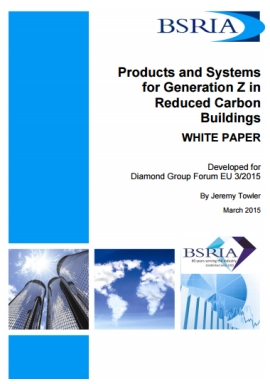Products and systems for generation Z in reduced carbon buildings
[edit] Introduction
In September 2015, BSRIA launched the white paper ‘Products and Systems for Generation Z in Reduced Carbon Buildings’, asking: what products and systems will be used in reduced carbon buildings in the future by the ‘smart’ generation?
The paper was developed for BSRIA’s Diamond Group Forum, a BSRIA network of senior executives. It was written by Jeremy Towler, Senior Manager, Energy & Smart Technologies, BSRIA Worldwide Market Intelligence, from data collected at the ISH exhibition in Frankfurt in March 2015.
The paper considers how the value of buildings can be improved to raise productivity and wellbeing for occupiers and at the same time generate new revenue streams for suppliers.
It examines:
- What will be the expectations of Generation Z – the ‘smart’ generation?
- What does our industry need to do to deliver these expectations and to achieve reduced CO2 targets over the next 10 years?
- What products and services will be required to achieve these objectives?’
Sometimes described as the ‘first tribe of true digital natives’ or ‘screenagers’, Generation Z (born from the mid-1990s to the present day) are characterised as smarter and more prudent than their Generation Y predecessors. They are empowered, have more job choices, seek freedom of movement and flexible working policies. They are the ‘see it – want it’, ‘touch it – get it now’ generation. When it comes to heating and cooling, unlike traditional systems, they expect them to just work, without any effort on their part.
[edit] What will be the expectations of Generation Z – the ‘smart’ generation?
When asked about expectations for buildings, Generation Z want devices that are aesthetically pleasing. They want to know immediately when there is something wrong in a building and, ideally, have the problem fixed immediately. They also want choice and it will be important for them to be able to choose their providers based on advice and transparency over the cost of products and services.
Regarding technology, they want simplified, flexible products, which are easily manageable because they themselves lack the skills to get involved in the detail. In short, they want passive system management.
[edit] What does our industry need to do to deliver these expectations and to achieve reduced CO2 targets over the next 10 years?
Julia Evans, Chief Executive at BSRIA, said: “Generation Z has also been characterised as the ‘sharing not the owning generation’. Therefore, there will need to be more options for renting and leasing rather than buying, due to higher capital costs. In relation to an uncertain energy future, Generation Z can see the immediate benefit of recycling.
“This generation has requested to ‘keep it simple’ and our industry needs to offer intelligent solutions that are more modular as well as being capable of being interconnected into a system to provide a global view. Therefore, products must standardise on how they communicate information between themselves. The intelligence should be built in to the controls and software.”
[edit] What products and services will be required to achieve these objectives?
Julia Evans said: “There was a general consensus that hybrid technologies would become dominant. Generation Z seem much happier to buy a service than own a product. This includes buying a solution to solve an energy-related problem, rather than the tangible product itself. Suppliers will, therefore, have to change their ‘modus-operandi’ to accommodate this stance.
“It also was found that there is a need for smarter, more connected products which are simple for both contractors and end-users. Generation Z will want the latest technology, with quick, tangible results but with little or no additional costs. There should be a focus on service – it is big business!”
--BSRIA
[edit] Related articles on Designing Buildings Wiki
Featured articles and news
One of the most impressive Victorian architects. Book review.
RTPI leader to become new CIOB Chief Executive Officer
Dr Victoria Hills MRTPI, FICE to take over after Caroline Gumble’s departure.
Social and affordable housing, a long term plan for delivery
The “Delivering a Decade of Renewal for Social and Affordable Housing” strategy sets out future path.
A change to adoptive architecture
Effects of global weather warming on architectural detailing, material choice and human interaction.
The proposed publicly owned and backed subsidiary of Homes England, to facilitate new homes.
How big is the problem and what can we do to mitigate the effects?
Overheating guidance and tools for building designers
A number of cool guides to help with the heat.
The UK's Modern Industrial Strategy: A 10 year plan
Previous consultation criticism, current key elements and general support with some persisting reservations.
Building Safety Regulator reforms
New roles, new staff and a new fast track service pave the way for a single construction regulator.
Architectural Technologist CPDs and Communications
CIAT CPD… and how you can do it!
Cooling centres and cool spaces
Managing extreme heat in cities by directing the public to places for heat stress relief and water sources.
Winter gardens: A brief history and warm variations
Extending the season with glass in different forms and terms.
Restoring Great Yarmouth's Winter Gardens
Transforming one of the least sustainable constructions imaginable.
Construction Skills Mission Board launch sector drive
Newly formed government and industry collaboration set strategy for recruiting an additional 100,000 construction workers a year.
New Architects Code comes into effect in September 2025
ARB Architects Code of Conduct and Practice available with ongoing consultation regarding guidance.
Welsh Skills Body (Medr) launches ambitious plan
The new skills body brings together funding and regulation of tertiary education and research for the devolved nation.
Paul Gandy FCIOB announced as next CIOB President
Former Tilbury Douglas CEO takes helm.
























